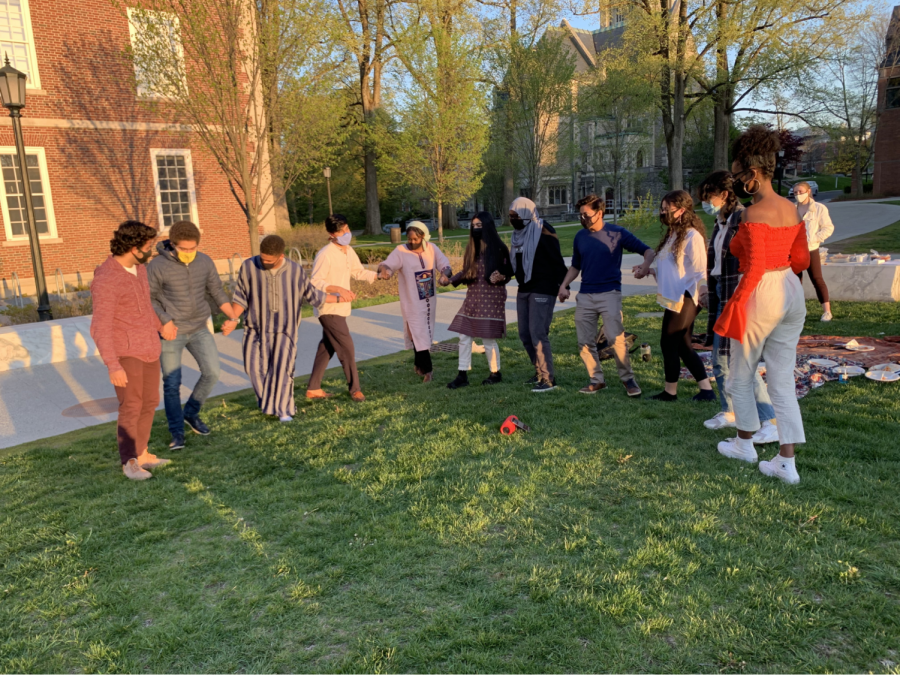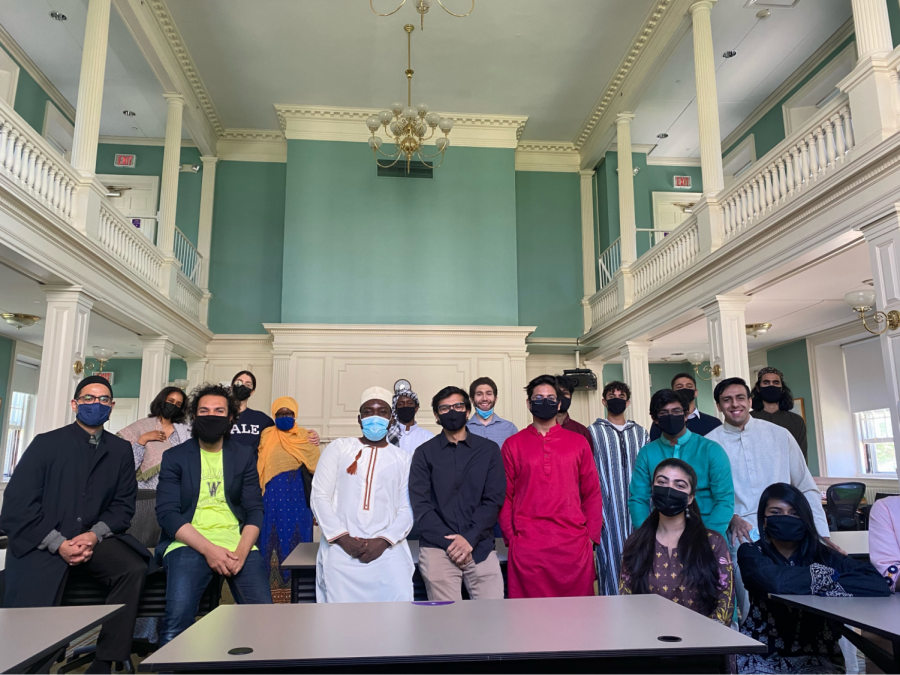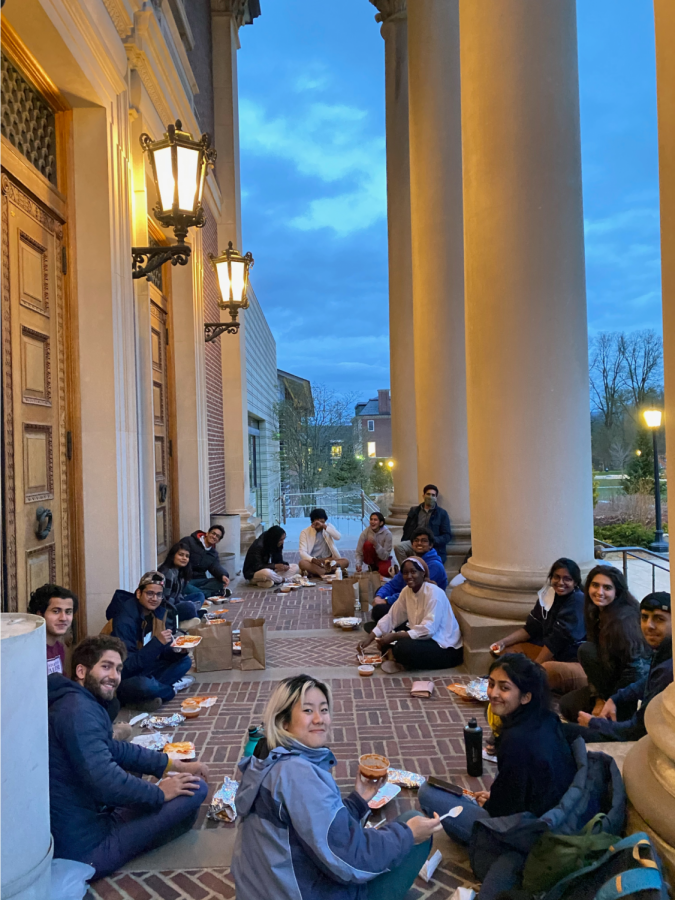Students observe Ramadan, celebrate Eid amid pandemic
May 19, 2021

On Thursday evening, Samir Ahmed ’24, along with a majority of the Muslim Student Union (MSU) and a scattering of other community members, gathered in front of Sawyer Library to celebrate Eid al-Fitr, which follows the end of Ramadan. Having fasted from sunrise to sunset for the past month, Ahmed dug into a plate of tofu fried rice and bibimbap to mark the end of the Muslim holy month.
The Eid celebration came at the end of a long lunar month for Muslim students, who experienced difficulties observing Ramadan with COVID-mandated restrictions on student activity. The typical communal aspects of Ramadan as well as eating and praying with others before dawn and after sunset needed to be adapted for a pandemic. However, despite the unusual circumstances, students were able to persevere and observe this important religious month.
COVID’s impact on Ramadan
Growing up in Pakistan, communal observance of Ramadan was an annual occurrence for Soban Mehmood ’21, with multiple generations of family members fasting together and visiting relatives. When COVID first hit last spring and students were sent home, Mehmood was one of about a dozen Muslim students who stayed on campus through Ramadan. For him, the sense of isolation on a closed campus and the sudden transition of courses to a remote format made Ramadan seem to pass slowly.
This spring was different. “It feels a lot more normal because other things have become more normal [despite COVID],” Mehmood said. “You’re going to classes and doing things like that. It’s certainly felt like it’s gone by really fast for me.”
However, Mehmood noted that this Ramadan still felt strange compared to a normal year where students would be able to gather together. “The nightly prayers are something that I miss because when done properly, it’s kind of long and it’s tiring because you have to stand for a long time, but you listen to Quranic recitation,” he said. “It kind of supplements the fast as spiritual nourishment of some sort.”
Mehmood stressed the important role that religious traditions play during Ramadan. “If you’re not able to complement fasting with ritual worship practices, then it seems like just a change in routine, like instead of eating at 10 a.m., you’re eating at 3 a.m.,” he said. “So that’s why that’s something I really cherish.”

Seynabou Diop ’21 described Ramadan as a pause, noting that without needing to plan meals, she had more time to focus on other things, including reflection and prayer. She said that during Ramadan an individual “physically cannot go at the same pace” as one normally does, which helps to facilitate a slower lifestyle.
Mohammad Faizaan ’23, a 2021-2022 co-chair of the MSU, said that Ramadan offers him an opportunity for spiritual revival through prayer and spiritual engagement with himself. The month prompts him to ask himself how he can be a better person or take this time to grow.
“The number one objective of Ramadan, and all religion, is to get closer to God and closer to yourself, and the nature of fasting demands that this be done through community-oriented events,” Mohammad Mehdi Mojarradi ’23, a 2020-2021 MSU co-chair said. The community-building aspect of Ramadan at the College has been put on a hold for Mojarradi, as he was sent home last spring due to COVID and is remote this semester.
Food and fasting
In a month of daytime fasting, nighttime meals are critical to both community-building and the individual well-being of the practitioners. “We traditionally eat sweet things for Iftar for the whole month of Ramadan, from pastries to soups,” said Diop, who is Senegalese. “In years past, we would have meals catered by Spice Root, Blue Mango, and Dining [Services], depending on the day of the week.” These meals were generally well-attended, with around 50 people jammed into the Muslim common room in the basement of Thompson Chapel.
Diop added that Ramadan doesn’t feel the same without a vibrant community to celebrate with. “Without community, observing at home or in a country where it is a broader experience, Ramadan is duller,” she said. An international student, Diop stayed on campus post-shutdown last year, and expressed her gratitude towards the dining staff for providing the remaining Muslims on campus with snacks and a meal even while the campus was in flux.

This semester, Iftar meal distribution was handled by Dining Services through MSU. MSU sent out a Google Form to the school, and students were able to indicate if they would be requiring meals for Ramadan. Each night, Dining Services provided these students with two heavy trays filled with breakfast foods, sandwiches, fruit, milk, yogurt, pretzels, apple and orange juices, and Gatorade. On Mondays and Thursdays, students received a care package for Suhoor, the pre-dawn meal before fasting starts, full of oatmeal, cereal, granola bars, trail mix, dates, and apricots, and a variety of soups.
Each Wednesday, according to Faizaan, Dining staff prepared a special meal that reflected the geographical and cultural diversity of Muslim students at the College. Students were served chicken tikka masala to represent South Asian cuisine; vegetables, lamb kabobs, and couscous for the Middle East; beef London broil to represent the European Muslim community; and Moroccan salmon to represent Muslims in the Maghreb in North Africa.
The MSU, then and now
Even without access to the Muslim common room in Thompson Chapel, the MSU has worked to foster a sense of community this spring. “The MSU has been a very nice space,” Faizaan said. “In normal years, having that common room would have been a blessing, but we’re still trying to make do with as much as we possibly can and that’s exactly why I joined the MSU in the first place.”
Faizaan added that MSU members have run into each other collecting Ramadan trays from Paresky, making fun jokes and bantering with one another, creating a “family away from family.”
“The MSU doesn’t care if you’re religious or not religious or even if you’re not Muslim and just want to learn about stuff,” he said. “We just want to offer that space up for everyone to join and engage with one another. If you are a very devout Muslim, we have options and events for you. If you’re someone who wants to learn more, we have events for that too. If you’re just someone who wants to be there and hang out with people, we have events for that.”

This sense of community struck a deep chord with Mehmood, a senior who has experienced both pre-COVID and COVID Ramadans at the College. “One of the most precious experiences I’ve had, especially pre-COVID, that I really miss during COVID times, is the community in the Thompson Chapel basement,” Mehmood said. “It was kind of a casual place — some people would just live there and some people could come and go. Ramadan would just heighten it. We would see a lot of people and we would decorate the place during that time.”
Mehmood described how the Muslim common room would attract students from other religious backgrounds who would sometimes participate in fasting as well. “I think there’s a lot more potential for interfaith activities at Williams than actually occurs and Ramadan is a good opportunity to do that kind of stuff,” he added.
This year, the MSU also organized a virtual event with the Amherst Muslim Student Association titled “Laylatul Qadr and God’s Forgiveness.” The hour-long event consisted of a speaker and an open floor for students to discuss Laylatul Qadr, the night Muslims believe the Quran was revealed.
For Faizaan, Ramadan has remained a family-centric holiday, as he has spent hours on Zoom with his family to celebrate the holiday from afar. It is the practice of some Muslims to finish the Quran over the course of Ramadan, which Faizaan’s family accomplished together in person while Faizaan stood in prayer remotely alongside them for two hours each night.
Ahmed recounted fond childhood memories of getting up early in the morning for a meal before dawn with his family, competing with his cousins to see who could fast for the most days out of the month. “Ramadan is an important part of remembering who I am, growing up in a Western society where I’d frequently be the only Muslim in my classes, and it feels weird not to be surrounded by family during this Ramadan,” he said.
With Mojarradi set to attend the Williams-Exeter Programme at Oxford next year, he is excited about spending Ramadan with other Williams students in spring 2022. Although he had nightly or bi-nightly calls this semester with some friends to check in and discuss passages from the Quran, he still felt like he was missing out on activities at the College.
As the holy month wrapped up, Mojarradi said that recent violence in Palestine and Afghanistan contradicted the spirit of Ramadan. “Ramadan is a time for building community through helping people, being there for brothers and sisters, standing up against injustice and oppression,” he said.








